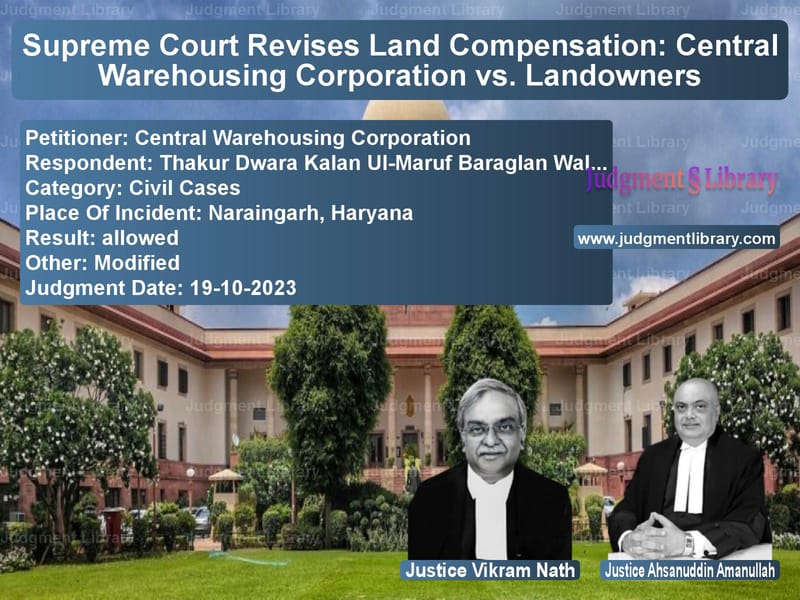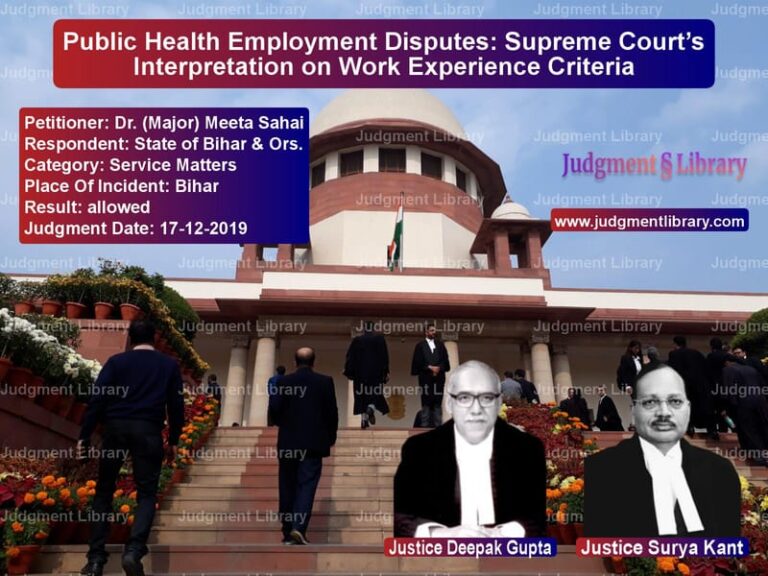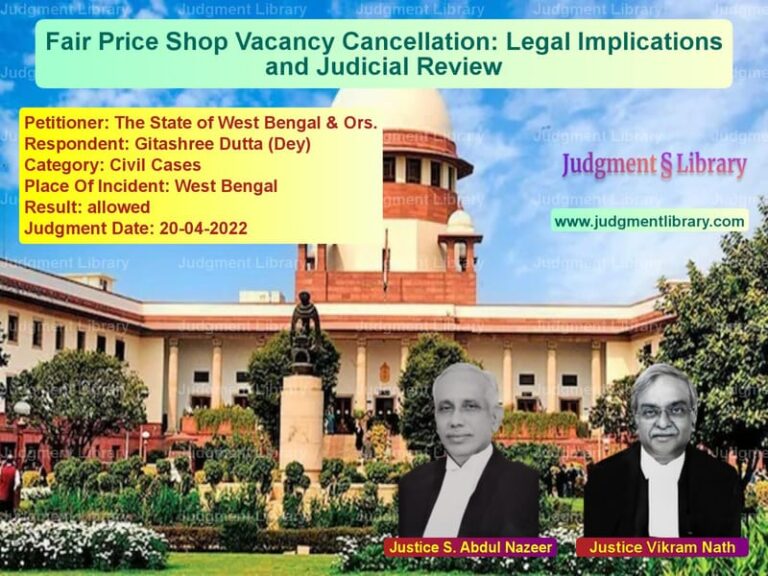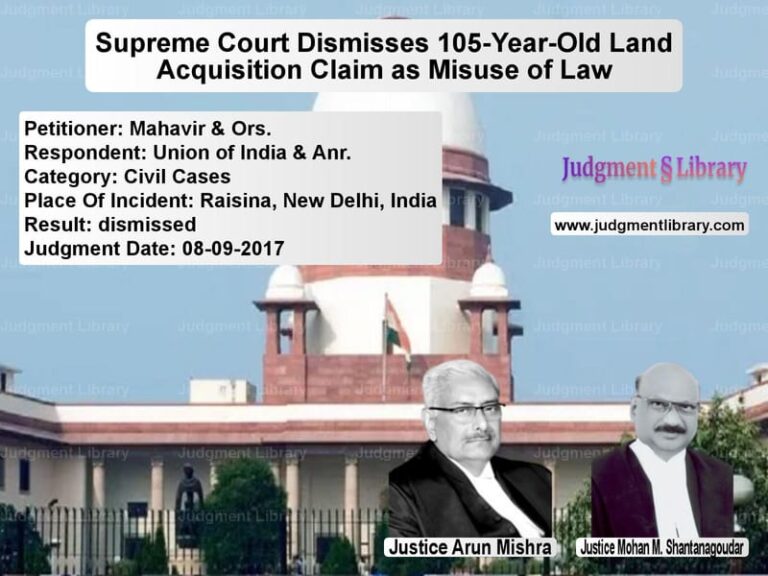Supreme Court Revises Land Compensation: Central Warehousing Corporation vs. Landowners
The Supreme Court of India recently delivered a significant judgment in Central Warehousing Corporation vs. Thakur Dwara Kalan Ul-Maruf Baraglan Wala & Ors., dealing with the issue of land acquisition compensation. The case revolved around determining a fair and just amount of compensation for landowners whose property was acquired under the Land Acquisition Act, 1894. The Court examined whether the Punjab & Haryana High Court had correctly applied an annual increase in land value while calculating compensation.
Background of the Case
The dispute arose from the acquisition of 80 Kanals and 11 Marlas of land in Naraingarh, Ambala, Haryana, for the benefit of the Central Warehousing Corporation (CWC). The government issued a notification under Section 4 of the Land Acquisition Act on 10 November 2000, followed by a declaration under Section 6 on 19 March 2001. The Land Acquisition Collector awarded compensation of Rs. 3.5 lakhs per acre (equivalent to Rs. 72.31 per square yard).
However, the landowners sought higher compensation, arguing that their land had significant commercial potential due to its proximity to key locations such as the Haryana Urban Development Authority (HUDA) sectors, Government College, and Senior Secondary School, Naraingarh.
Arguments by the Petitioner – Central Warehousing Corporation
The Central Warehousing Corporation (CWC) contended that:
- The Reference Court and High Court incorrectly increased the compensation without sufficient supporting evidence.
- The land was primarily agricultural and not commercial, making the original compensation fair.
- The 15% annual increase applied cumulatively for 11 years by the High Court was excessive and unjustified.
- There was no concrete sale transaction from the relevant period to justify the increased valuation.
- The compensation should align with judicial precedents that limit the annual increase to 8% to 12% for short durations (3-5 years), rather than applying an increase for 11 years.
Arguments by the Respondents – Landowners
The landowners argued that:
- The land had high market potential due to its location.
- The compensation determined by the Land Acquisition Collector was far below market value.
- Nearby land acquisitions in 1989 had received a higher rate, and applying a cumulative increase was a fair method to arrive at a reasonable price for 2000.
- The High Court’s decision to apply a 15% annual increase for 11 years was appropriate considering inflation and rising land values.
Decision of the Punjab & Haryana High Court
The High Court revised the compensation using a cumulative 15% annual increase over 11 years. It relied on the previous land acquisition order of 1989, which had determined compensation at Rs. 89.91 per square yard. By applying the 15% cumulative increase, the High Court raised the compensation to Rs. 493 per square yard.
Supreme Court’s Observations
The Supreme Court ruled that the High Court had erred in applying a 15% cumulative increase for an extended period of 11 years. The Court made the following key observations:
- Annual Increase Must Be Limited: The Court cited General Manager, ONGC vs. Rameshbhai Jivanbhai Patel, which warned against applying cumulative increases beyond 4-5 years.
- Comparable Sale Deeds Were Absent: No sale transactions from the relevant period supported such an increase.
- 8% Annual Increase is More Appropriate: The Court ruled that applying a cumulative 8% annual increase was more reasonable, considering the 11-year gap between acquisitions.
- Market Value Must Be Balanced: Compensation must fairly compensate landowners while avoiding excessive financial burdens on the government.
Supreme Court’s Final Ruling
The Supreme Court set aside the High Court’s decision and ruled that:
- Compensation should be recalculated using an 8% cumulative annual increase instead of 15%.
- The Land Acquisition Collector must conduct a final assessment based on the Supreme Court’s guidelines.
- Any excess payment made to landowners must be refunded, while any shortfall must be paid within two months.
Implications of the Judgment
This ruling has major implications for future land acquisitions:
- Fair and Just Compensation: The ruling ensures that compensation reflects actual market conditions, avoiding speculative increases.
- Precedent for Future Cases: The judgment sets a standard that prevents exaggerated claims and ensures a balanced approach to land acquisition disputes.
- Judicial Oversight on Cumulative Increases: Courts must apply reasonable annual increases instead of arbitrary or excessive rates.
Conclusion
The Supreme Court’s verdict in this case reinforces the importance of a balanced approach to land acquisition compensation. By setting aside the High Court’s excessive increase and replacing it with a more justified 8% cumulative increase, the Court ensures fair compensation for landowners without imposing an undue burden on public resources. This decision will guide future land acquisition cases, ensuring consistency in compensation awards.
Petitioner Name: Central Warehousing Corporation.Respondent Name: Thakur Dwara Kalan Ul-Maruf Baraglan Wala & Ors..Judgment By: Justice Vikram Nath, Justice Ahsanuddin Amanullah.Place Of Incident: Naraingarh, Haryana.Judgment Date: 19-10-2023.
Don’t miss out on the full details! Download the complete judgment in PDF format below and gain valuable insights instantly!
Download Judgment: central-warehousing-vs-thakur-dwara-kalan-u-supreme-court-of-india-judgment-dated-19-10-2023.pdf
Directly Download Judgment: Directly download this Judgment
See all petitions in Contract Disputes
See all petitions in Damages and Compensation
See all petitions in Judgment by Vikram Nath
See all petitions in Judgment by Ahsanuddin Amanullah
See all petitions in allowed
See all petitions in Modified
See all petitions in supreme court of India judgments October 2023
See all petitions in 2023 judgments
See all posts in Civil Cases Category
See all allowed petitions in Civil Cases Category
See all Dismissed petitions in Civil Cases Category
See all partially allowed petitions in Civil Cases Category







